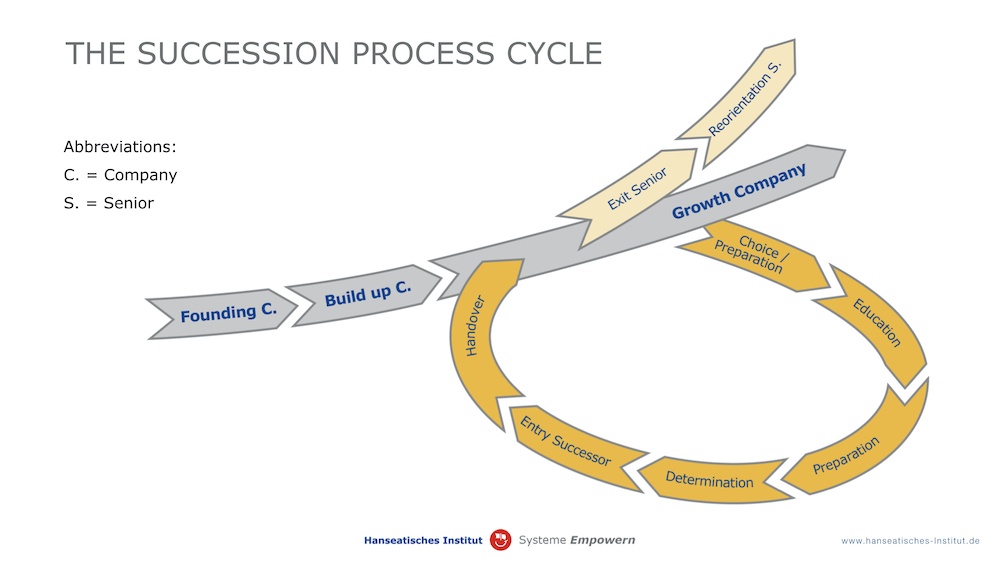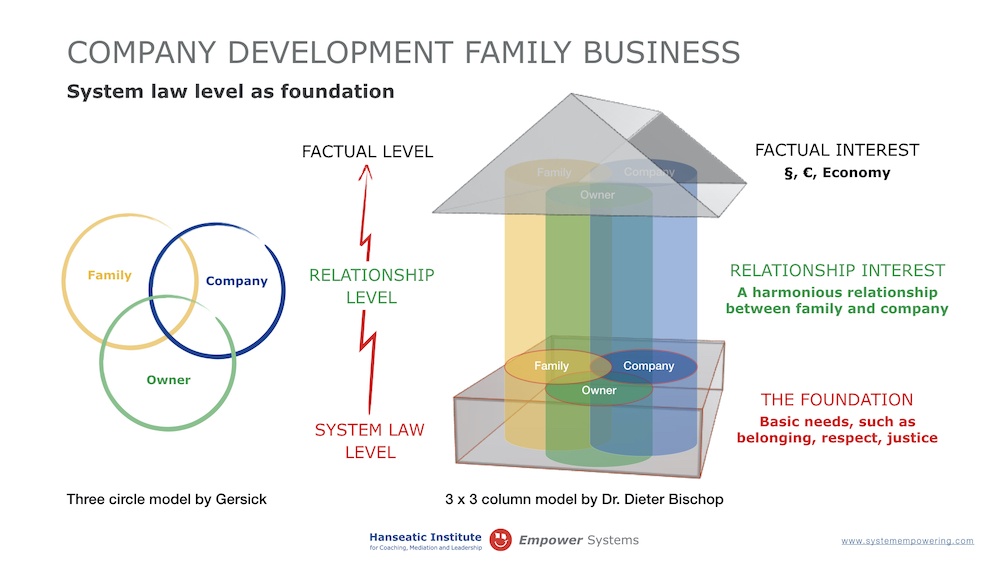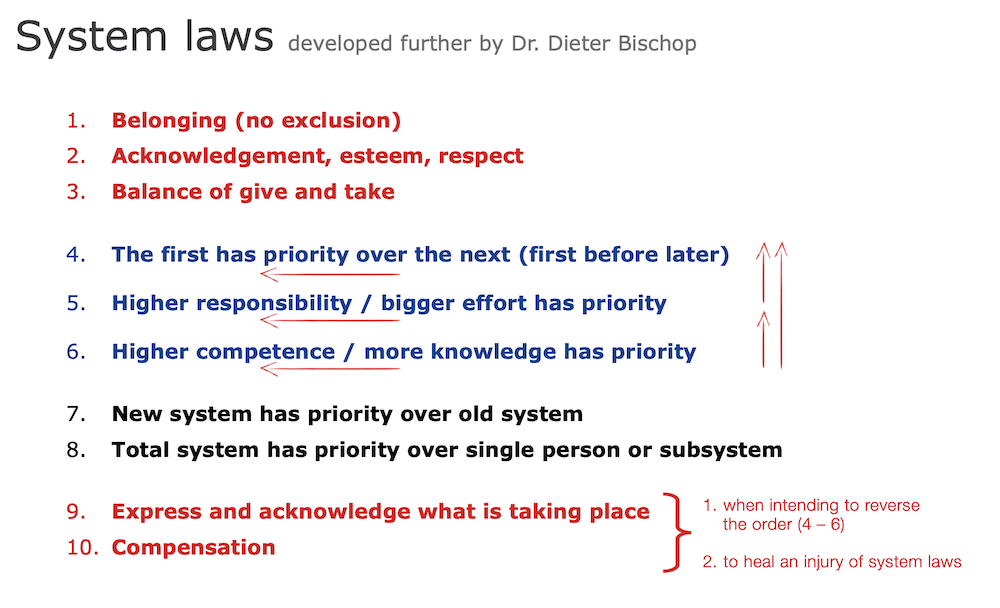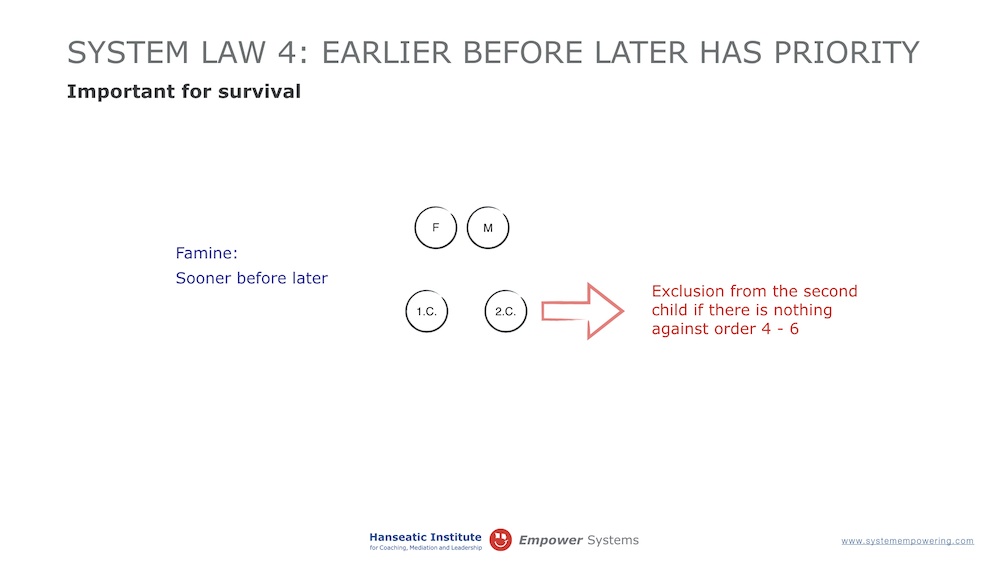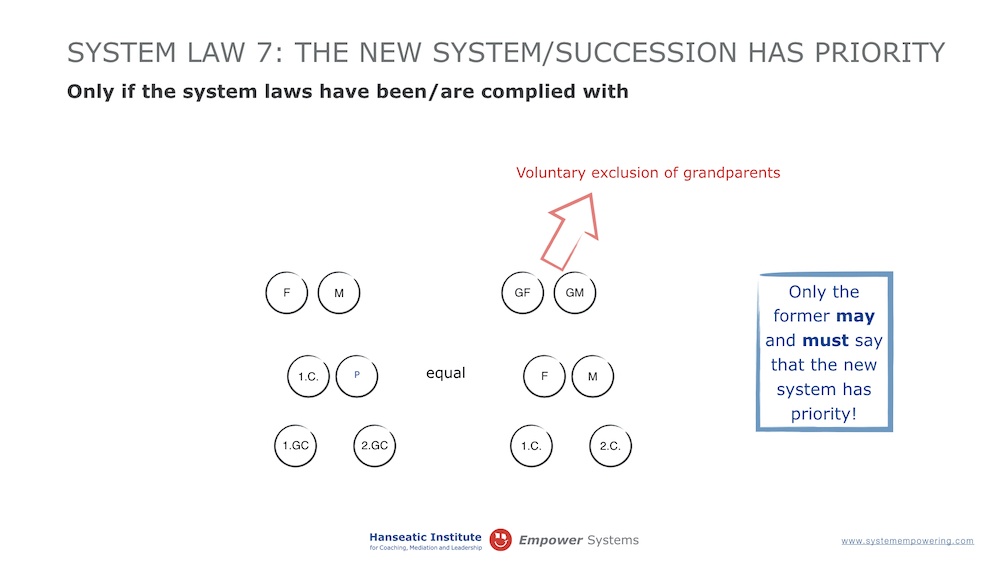INTEGRAL BUSINESS SUCCESSION IN FAMILY BUSINESSES
Succession in family businesses should be taken into account right from the start. After all, at the beginning the course is set, which can lead to difficulties in the succession. For example, the question of how financial security is secured after leaving the company. Must be paid for out of current business or has a path been chosen that is independent of the company.
The next step is to find a successor very early on. The successor must fit in with the company – regardless of whether he or she comes from the company’s own family or is transferred to an external party.
The question of what the founding couple will do when they are no longer with the company must also be clarified. What negative effects can this have? And what must be done to prevent them from happening. For example, what should I do with my free time? Boredom? – What can be done that makes sense after they leave the company? What makes sense?
Typical Problems and Issues in an Integral Business Succession in Family Businesses
Topics, which are clarified in our special field of succession in family businesses
In a company succession, i.e. an owner wants to pass on or sell his company to a family member (son/daughter), questions and conflicts often arise. These can be roughly divided into two areas. One area is the functional level, the other area is the system law level.
Typical questions or problems on the factual level
- Inheritance/transfer of shares, special business assets, ownership
- Question of legal form/contract design
- Tax optimization
- Family system interlocked with corporate system and ownership
- A fair balance sought among family members
- Role allocation in corporate management unclear
- Date of transfer not specified
- Lack of preparation for emergencies
- Insecurity among employees
- No external pension scheme
Typical questions or problems on the System Law Level
Senior/Surrenderer
- Can hardly let go of responsibility
- Breaches of systemic law between the parents (senior and female senior) and thus also between the parents and the child (successor)
- Lack of acceptance of the successor
- Desire to preserve the structures
- Insufficient vision/strategy in place
- Need for security
- Fear of loss
- Does not feel sufficiently respected or excluded by the successor
Successor
- Desire for autonomy
- Does not respect the past sufficiently
- Exclusion of the senior citizen
- Desire for change
- Too high or low risk tolerance
- Lack of availability or use
- Duty of succession
- Vision or life goal does not correspond to the succession
- Does not feel sufficiently respected or excluded by the senior or the employees
- Insufficient vision/strategy in place
Company
- Insufficient vision/strategy in place
- Conflicts at work
- Conflicts have long been smouldering
- Many indirect participants
Family
- High level of conflict due to unresolved family conflicts
- Conflicts have been smouldering for a long time, rivalry, order not respected
- Injustice, many indirectly involved persons like relatives, no family constitution
Owner
- Financing unsolved
- Different company valuation
- Injustice
- Old-age provision unsettled
The System Laws as the Foundation and Prerequisite for a Successful Succession
Company succession in family businesses can only succeed if the system laws such as affiliation, recognition, balance/justice, earlier before later and new system before old system are taken into account.
System law 4: Earlier before later has priority is in apparent contradiction to system law 7: New system before old system. For the sake of clarity, let us take the example of a parent couple with young children who are not yet able to look after themselves. If there was a famine in earlier times, the youngest child was usually sacrificed (Hansel and Gretel) so that the rest could survive. So here the rule was: sooner before later has priority. If there is a famine again a generation later and the former parents are now grandparents, the child is now a parent and there are grandchildren, then according to system law 4 the youngest grandchild would have to be sacrificed again.
However, this does not make sense systemically, but then system law 7 applies: The new system has priority, i.e. the grandparents will sacrifice themselves (withdraw to the plaice) so that the children and grandchildren can survive. If the parents or grandparents are balanced couples and there is trust, appreciation and respect between them and the children/successors and if the system laws are observed, the former/grandparents will withdraw of their own accord. The former therefore say that the new system/successor should take precedence.
The following applies: Only the former may and must say that the new system takes precedence. This only happens if the first six system laws have been/are followed.
If there are violations of the system law between the grandparents and/or parents, i.e. divorce, war of the roses, exclusion, bad language, injustice, there are also violations of the system law between the grandparents and the children. Now the grandparents/parents of the children will not withdraw voluntarily. In doing so they violate system law 7: New system before old. The successors will then be forced to ask the survivors to withdraw. This request hurts the survivors, they feel excluded, not sufficiently respected, it is unfair and the former is not recognized.
This means that there are further violations of systemic law, which, for example, lead to the transferor putting his successor on the street.
Conclusion: System law violations among the transferors and between transferors and successors must be resolved so that a succession can succeed. That is why we also start with the resolution of system law violations among the transferors.
Exemplary Cases from Integral Business Succession in Family Businesses
Exclusion of the Former
Most of all family successions fail when the family business passes into the second generation, the grandchild generation. The junior is often prepared for the takeover by studying business administration. The old boss was still someone who was able to help out, who developed, who walked around the factory halls, who still knew the employees personally.
Junior makes everything different. Numbers or new structures such as IT, cost accounting or new manners are important to him. He may also have no feeling for research and development, for the products and no direct contact with the employees.
The employees and the senior no longer feel appreciated and excluded by the old culture. The employees are loyal to the old man and the senior and want to keep him and push the junior out. The senior cannot let go in such a situation and must stand up for the old. This inevitably leads to a fight between senior and junior.
Knowledge and application of the laws of the system, such as recognition, can contribute to a solution. Use it!
Unconsciously wanting to drive the acquired company into the wall
The owner of a large holding company with three companies A, B and C took it over from his father. His father was a strong driving force and developer for the largest of the three companies A. He and his wife separated for this reason, as company A was more important to him. This led to system law violations at the mother, at him and at the son. The son then grew up with his mother and stepfather.
When he then took over the holding company from his father, it was unconsciously as a reaction to the exclusion and lack of recognition of the father to the mother and son that he wanted to drive the company to the wall. He only became aware of this during coaching. The solution for him was to sell company A. He kept the holding company and the companies B and C. And he founded a new company in which he could realize his own vision.
Sliding up the generations - taking the wrong place
If an ancestor, e.g. the grandfather died in the war and the injuries such as suffering, grief, fear and anger were not dissolved by those left behind or, even worse, the grandfather is hushed up, it very often happens that a son or daughter slips into the role of the grandfather, i.e. takes responsibility for the grandmother and also for the younger siblings. This shift in the generation continues, so that the grandchild (the child of the one who slides up) also slides up and takes over the role of the grandfather and even more so the role of the one who slides up.
This slipping up has strong negative effects and is also reflected in the succession. The future successor is not yet managing director, but already behaves in this way towards his father. This leads to violations of the system law. The cause is that the son unconsciously acts from the role of the grandfather.
Requirements for a Successful Family Succession
- Long-term preparation
- A vision is present
- The successor(s) will voluntarily become the successor(s)
- Mutual respect and trust exists
- The system laws are observed or system law violations are/are resolved
- Advice on the subject level is interlinked with advice on the system law level
Typical topics that are clarified by integral corporate succession consulting (Consultant and System Empowerer)
- Inheritance/transfer of shares and special business assets
- Question of legal form/contract design
- Tax optimization
- Family system interlocked with corporate system
- A fair balance among the family members is sought
- The distribution of roles in corporate management is clarified
- Date of handover to be determined
- Preparation for emergencies
- Uncertainty among employees is reduced
- Lack of recognition or exclusion between the Senior and Junior will be resolved
- The vision of the company and the vision of the successor are present and fit together
- Family conflicts and systemic law violations exist and are being resolved
Below is an example of our typical procedure in a company succession in a family business, in which system law violations must first be resolved. Such a process can take one or two years. The faster the system law violations are resolved, the better. However, this all has to be done on the side during ongoing operations, which is why it often takes longer than desired and therefore there can be setbacks.
Typical Procedure of the System Empowerer in a Company Succession at a Glance
Parents: First I start with the parents. Once all the requirements for resolving systemic law violations are met there (for example, with the help of the genea and empowering method) and the violations between the parent couple (father and mother) have been resolved, I move on to the children/successors.
Parents ̶ Children/successors: When all systemic law violations between the children/successors and between the children and the parents have been resolved, the factual level such as tax, legal and financial issues will be clarified with the help of further advisors, the family and the CoachMediator.
Parents ̶ children/successors ̶ further advisors: An integral approach is important here, because, for example, a tax savings construct can trigger system law violations. At the same time, the company is considered. The system law violations between parents and children/successors will also be reflected in the company as system law violations.
Parents ̶ Children/successors ̶ Company: This must then also be resolved within the company.
Individual work with the parents
- System law level, system laws and how
injuries can be resolved, imagine - Elaborate systemogram (system laws)
- Work out a time/cause diagram
- If necessary, coaching to strengthen the parents and dissolve injuries between father and mother (for example, with the help of the Genea and Empowering Method)
Parents and children
- System law level, system laws and how
injuries can be resolved, imagine
Children
- Drawing up a systemogram (system laws)
- Work out a time/cause diagram
- Clarify further procedure (identify pairs of conflicts)
In pairs or with parents
- Dissolve system law violations pairwise between parents and children and between children.
Parents, children and consultants (Taxes, Law, …)
- Planning company succession – subject level
involvement, role clarification, tasks for the senior
outside the company…
Parents, children and employees of the company
- Clarify conflicts within the company (see the
Procedure for team development, team vision,
team roles)
Our integral corporate succession service is the combination of the success factors and methods of tax & legal consulting and systemic coaching / mediation to find joint, effective and sustainable solutions.
The Hanseatic Institute for System Empowering works with various law and tax consulting firms as cooperation partners throughout Germany to ensure that succession in family businesses is successful and harmonious.

